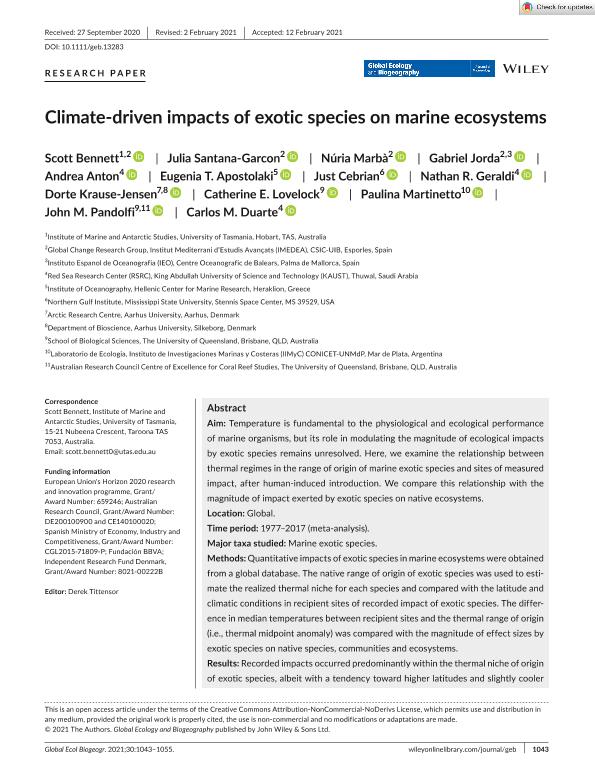Mostrar el registro sencillo del ítem
dc.contributor.author
Bennett, Scott
dc.contributor.author
Santana Garcon, Julia
dc.contributor.author
Marbà, Núria
dc.contributor.author
Jorda, Gabriel
dc.contributor.author
Anton, Andrea
dc.contributor.author
Apostolaki, Eugenia T.
dc.contributor.author
Cebrian, Just
dc.contributor.author
Geraldi, Nathan R.
dc.contributor.author
Krause Jensen, Dorte
dc.contributor.author
Lovelock, Catherine E.
dc.contributor.author
Martinetto, Paulina Maria del Rosario

dc.contributor.author
Pandolfi, John M.
dc.contributor.author
Duarte, Carlos M.
dc.date.available
2022-07-01T13:29:38Z
dc.date.issued
2021-05-12
dc.identifier.citation
Bennett, Scott; Santana Garcon, Julia; Marbà, Núria; Jorda, Gabriel; Anton, Andrea; et al.; Climate-driven impacts of exotic species on marine ecosystems; Wiley Blackwell Publishing, Inc; Global Ecology and Biogeography; 30; 5; 12-5-2021; 1043-1055
dc.identifier.issn
1466-822X
dc.identifier.uri
http://hdl.handle.net/11336/161053
dc.description.abstract
Aim: Temperature is fundamental to the physiological and ecological performance of marine organisms, but its role in modulating the magnitude of ecological impacts by exotic species remains unresolved. Here, we examine the relationship between thermal regimes in the range of origin of marine exotic species and sites of measured impact, after human-induced introduction. We compare this relationship with the magnitude of impact exerted by exotic species on native ecosystems. Location: Global. Time period: 1977–2017 (meta-analysis). Major taxa studied: Marine exotic species. Methods: Quantitative impacts of exotic species in marine ecosystems were obtained from a global database. The native range of origin of exotic species was used to estimate the realized thermal niche for each species and compared with the latitude and climatic conditions in recipient sites of recorded impact of exotic species. The difference in median temperatures between recipient sites and the thermal range of origin (i.e., thermal midpoint anomaly) was compared with the magnitude of effect sizes by exotic species on native species, communities and ecosystems. Results: Recorded impacts occurred predominantly within the thermal niche of origin of exotic species, albeit with a tendency toward higher latitudes and slightly cooler conditions. The severity of impacts by exotic species on abundance of native taxa displayed a hump-shaped relationship with temperature. Peak impacts were recorded in recipient sites that were 2.2°C cooler than the thermal midpoint of the range of origin of exotic species, and impacts decreased in magnitude toward higher and lower thermal anomalies. Main conclusions: Our findings highlight how temperature and climatic context influence ecological impacts by exotic species in marine ecosystems and the implications for existing and novel species interactions under climate change.
dc.format
application/pdf
dc.language.iso
eng
dc.publisher
Wiley Blackwell Publishing, Inc

dc.rights
info:eu-repo/semantics/openAccess
dc.rights.uri
https://creativecommons.org/licenses/by-nc-nd/2.5/ar/
dc.subject
ALIEN
dc.subject
CLIMATE CHANGE
dc.subject
ENVIRONMENTAL MATCHING
dc.subject
INVASIVE
dc.subject
NON-NATIVE
dc.subject
TEMPERATURE
dc.subject.classification
Ecología

dc.subject.classification
Ciencias Biológicas

dc.subject.classification
CIENCIAS NATURALES Y EXACTAS

dc.title
Climate-driven impacts of exotic species on marine ecosystems
dc.type
info:eu-repo/semantics/article
dc.type
info:ar-repo/semantics/artículo
dc.type
info:eu-repo/semantics/publishedVersion
dc.date.updated
2022-05-06T16:30:34Z
dc.journal.volume
30
dc.journal.number
5
dc.journal.pagination
1043-1055
dc.journal.pais
Reino Unido

dc.journal.ciudad
Londres
dc.description.fil
Fil: Bennett, Scott. Consejo Superior de Investigaciones Científicas. Instituto Mediterráneo de Estudios Avanzados; España. University of Tasmania; Australia
dc.description.fil
Fil: Santana Garcon, Julia. Consejo Superior de Investigaciones Científicas. Instituto Mediterráneo de Estudios Avanzados; España
dc.description.fil
Fil: Marbà, Núria. Consejo Superior de Investigaciones Científicas. Instituto Mediterráneo de Estudios Avanzados; España
dc.description.fil
Fil: Jorda, Gabriel. Consejo Superior de Investigaciones Científicas. Instituto Mediterráneo de Estudios Avanzados; España
dc.description.fil
Fil: Anton, Andrea. King Abdullah University of Science and Technology; Arabia Saudita
dc.description.fil
Fil: Apostolaki, Eugenia T.. Hellenic Center for Marine Research; Grecia
dc.description.fil
Fil: Cebrian, Just. Mississippi State University; Estados Unidos
dc.description.fil
Fil: Geraldi, Nathan R.. King Abdullah University of Science and Technology; Arabia Saudita
dc.description.fil
Fil: Krause Jensen, Dorte. University Aarhus; Dinamarca
dc.description.fil
Fil: Lovelock, Catherine E.. The University of Queensland; Australia
dc.description.fil
Fil: Martinetto, Paulina Maria del Rosario. Consejo Nacional de Investigaciones Científicas y Técnicas. Centro Científico Tecnológico Conicet - Mar del Plata. Instituto de Investigaciones Marinas y Costeras. Universidad Nacional de Mar del Plata. Facultad de Ciencias Exactas y Naturales. Instituto de Investigaciones Marinas y Costeras; Argentina
dc.description.fil
Fil: Pandolfi, John M.. The University of Queensland; Australia
dc.description.fil
Fil: Duarte, Carlos M.. King Abdullah University of Science and Technology; Arabia Saudita
dc.journal.title
Global Ecology and Biogeography

dc.relation.alternativeid
info:eu-repo/semantics/altIdentifier/url/https://onlinelibrary.wiley.com/doi/10.1111/geb.13283
dc.relation.alternativeid
info:eu-repo/semantics/altIdentifier/doi/https://doi.org/10.1111/geb.13283
Archivos asociados
